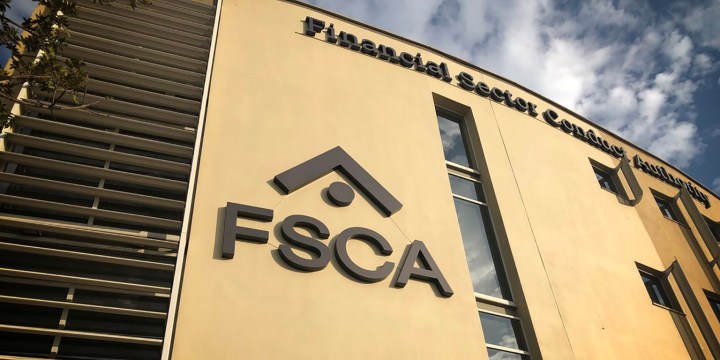BUSINESS REFLECTION
After the Bell — FSCA is not here to protect bank accounts of the dishonourable rich

The FSCA should be passionately protecting the rights of people who are not politically connected businesspeople, not supporting the dubious arguments of SA’s new class of pampered billionaires.
A week ago, at the Banking Association of SA’s conference on banking ethics, the keynote speaker was Financial Sector Conduct Authority (FSCA) commissioner Unathi Kamlana. Right at the end of his speech, which covered many things, Kamlana turned to the issue of banks closing customers’ accounts. It’s important to register that this was a closed conference, but the FSCA has now put the speech up on its website.
It wasn’t a big part of his speech, but Kamlana did come out pretty strongly against banks “arbitrarily” closing accounts. In so doing, he consciously or unconsciously played into the chastisement à la mode in which various politicians are castigating banks for being “monopolistic”, and “untransformed” (as they have for years — nothing new).
No less a person than President Cyril Ramaphosa said in a stump speech a week ago that the “big five banks” exercised “monopolistic control”. He was speaking to the Minara Chamber of Commerce at an Al Baraka Bank function in Durban.
Ramaphosa highlighted how this dominance has supposedly excluded black South Africans from pivotal roles in the financial sector, according to a report on the event. Ramaphosa was playing into a long-standing pastime of criticising banks, which irritatingly tend to be careful when making loans, charging high interest rates when they do.
Nonsense argument
It’s crucial to note that Kamlana did not say that banks should not or do not have the right to close the accounts of their dubious customers. But he invited banks to be procedurally fair, including the ability to appeal, and to be transparent. So, you might say, nothing wrong with that. But unfortunately, he went further, more or less endorsing the “banks are opposed to black advancement” nonsense argument.
These are the crucial highlights:
“… the challenge lies in balancing the legitimate need to prevent illicit activities with the moral obligation to ensure access to financial services. So, as banks, you need to ask yourselves if you are succeeding in striking this balance—is your risk management approach not overly stringent? Instead of managing the risk, are you not taking the easy way out?”
“While we understand that banks possess the legal right under contract law to terminate client relationships, questions have been raised as to whether the prevailing common law position is fair to customers, particularly in a context where access to banking is a gateway to broader economic participation”.
Banks should ask if they are being fair to their customers, because “the lack of a bank account can severely limit an individual’s or a business’s ability to engage fully in the economy, affecting everything from receiving and making payments to accessing credit”.
What should banks do, procedurally? “Banks should not simply cite reputational risk; reasons must be concrete and consistently applied to prevent what might appear as arbitrary account closures. Customers must also have the right to appeal or seek redress to ensure the process remains just and equitable. The mechanism for appeal and redress should be straightforward and accessible, enabling affected parties to challenge decisions they believe are unfounded or have been applied unfairly.”
Frankly, I think this is all wrong. Kamlana seems to be thinking exclusively from the point of view of the dodgy bank client, clothed in the language of human rights. The problem is that if you start looking at it from a rights point of view, surely you need to consider the rights of the honest customers of the bank. Don’t they have some kind of right to not be associated with crooks?
Safeguards
Even if they don’t have that right in a judicial sense — and they don’t because access to a bank account at a particular bank of your choosing is not a legally protected right — what about bank shareholders? If a bank knows — or even suspects — one of its clients is suspected of fraudulent activity or withholds information about its source of funds, wouldn’t shareholders have a legal claim against the bank if they didn’t close the account and the bank’s reputation suffered? Doesn’t the bank have a right, nay the duty, to safeguard its integrity?
As it happens, SA banks have suffered enormous reputational damage from SA’s long list of tenderpreneur mafia, dodgy short-cutters, drug dealers, crooks of every description, and even some nationally respected business people. We would expect them now to step up their vigilance!
As we all know, this travesty was led by the Gupta family, but the shenanigans were certainly not exclusive to them. In the case of the Guptas, the only thing that really protected the banks was that they acted swiftly to close the family’s accounts. It also helped alert SA’s public to the issue of State Capture.
The FSCA, of all organisations, is now saying the Guptas should have had the right to an internal appeal. That of course could be contested in court, and then they could appeal the finding of that court, and then they could go to the Constitutional Court. And then it’s ten years later and they are in Dubai (of course they are already there. Natch). The point is that the banks’ ability to close accounts in this case saved SA from edging even closer to becoming a gangster state.
What about the other procedural questions? I think these are wrong too, or at least debatable. I assume Kamlana does not mean, when he says banks should be transparent, that they should be publicly transparent. As a journalist, I would love that, but what he must mean is that they should be transparent with the client.
But what are the banks supposed to say? Sorry, we are closing your account because we think you are a crook. I think that would be defamatory, no? If you were the bank, you could certainly ask a client why their deposits are way beyond their ostensible income, ask them to defend what might appear like a suspicious transaction, or why they are ignoring those old Ts & Cs. Fair enough. But it’s my understanding this is precisely what banks already do — ad nauseum.
Survé paper trail
There is actually only one case where we, as the public, know some of the details of an actual bank account closure case. If you examine the paper trail presented in court in the case between Iqbal Survé, who is famously resisting the closure of his bank accounts, and Nedbank, there was a whole string of questions and cross-questions and responses and demands between the client and Nedbank. Kamlana seems to think that banks just dump their customers at the drop of a hat — I’m willing to bet they take this pretty seriously. His assumption tells you a lot.
It’s not as though, as we know all too well, the ousted client does not have recourse in law. Once a bank does decide to close its client’s accounts, that is of course justiciable.
But the price the applicant pays in this situation is something called discovery, which is why we know that Survé, according to the bank, used a Chinese investor’s money in the African News Agency (ANA) to pay his ex-wife R25-million in their divorce settlement. He disputes this and says it was a loan. But the bank felt that at the very least, he was playing fast and loose with minority shareholders’ money, hence the decision to close his account.
Just think what would happen if believing that, the bank had decided they would not close his accounts. What would regulators think then? And shareholders? And bank clients? And the world?
The big irony here is that in the many cases involving Survé and the banks, the FSCA has actually been cited on the side of the banks. But I just wonder if this new approach of the FSCA doesn’t now strengthen Survé’s cases against the organisation. And whether the new-found sympathy senior members of the FSCA have for certain members of SA’s morally questionable elite explains why a whole string of cases against Survé and others have not come close to being settled despite being open for more than a decade?
Pampered billionaires
The FSCA is supposed to be passionately protecting the rights of people who are not politically connected businesspeople, not supporting the dubious arguments of SA’s new class of pampered billionaires who slam the race card on the table every time a bank takes action when they spend Chinese investors’ money in a divorce settlement (see above).
The notion that this somehow forms part of the financial inclusion debate is just nuts; from its list of seven million clients, Nedbank suspended 190 suspect client accounts in 2023. Account closures are not playing a big part in financial inclusion — to cite it in this context is just crazy.
This whole approach that we need to consider the “rights” of the perpetrator is too prevalent in modern South Africa and it’s one of the many reasons SA is in the economic dwang it is. Investors feel they can’t trust us or our systems because even when the law is broken, nothing happens, and the reason nothing happens is that all the regulators seem to care about is whether the perpetrator’s rights are intact.
If SA’s regulators are more concerned about the prerogative of dishonourable rich people rather than the rights of poor victims — who by the way didn’t get even a passing mention in the speech — it’s no wonder we are still languishing on the Financial Action Task Force grey list. DM


















Spot on, Tim! The obsession with ensuring that criminals are protected (legally and otherwise) is one of the key weaknesses of our country. I wonder though, why a certain Ms Odendaal’s accounts weren’t closed on the same basis?
Both Ramaphosa and Kamlana are dancing to the tune of Iqbal ‘ Dodgem & Duck’ Survé, nothing more than soundbites for voters. I am surprised ” Dodgem & Duck’ has not offered to print the posters and banners for the ANCs election campaign……oh wait he is broke all thanks to the banks.
“supposedly excluded black South Africans from pivotal roles in the financial sector”
“monopolistic”
“untransformed”
Literally, NO ONE is prevented from doing the following:”
1. Go to the CIPC website and incorporate a Pty Ltd, with name, MOI, bank accounts etc. – this costs almost nothing, takes a few minutes (CIPC), and bank accounts are open within 48 hours.
2. Apply for an FSP license at the FSCA – this costs a few thousand rand and takes approximately 3 months for approval (you do need certain qualifications – set by the FAIS Act and FSCA to protect consumers).
3. Go build a financial services empire.
The playing field is, and has been for many years, completely level for EVERYONE.
Just on the point of the “playing field is, and has been for many years, completely level for EVERYONE.”
If you explore the concept of ‘access’, you may find that numerous explicit and implicit factors (for those not in the obvious club) can be quite prohibitory and the “field” could only be level on paper. Access issues include education, language, resources. I imagine all these would be crucial here, and your point 3 probably requires a lot of resources.
Unfortunately the FSCA has become a tool of the RET cadre. They are more concerned with transforming the financial sector into a black owned, managed and operated structure than protecting the financial health and protection of consumers. Onerous and bureaucratic rules are implemented with no recourse for the Financial Services providers. Legislation by regulation. Worst of all, service providers face the threat of disbarment if publicly disagree with the FSCA. And that is written into the regulations.